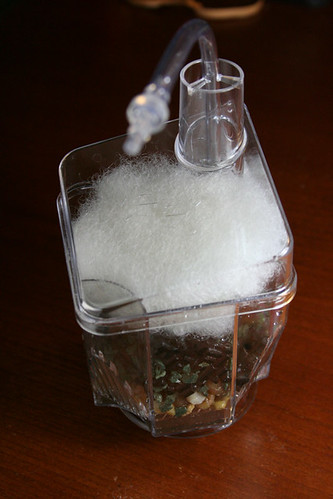Yes, a filter is an essential component in most fish tanks. Here's why a filter is important:
- Removal of Waste Products: Fish produce waste, and over time, this waste breaks down into ammonia, which is toxic to fish even at low levels. A filter helps to remove these waste products from the water, maintaining a healthy environment for your fish.
- Biological Filtration: A critical role of a filter is to provide biological filtration. Beneficial bacteria colonize the filter media and convert harmful ammonia into nitrites and then into less harmful nitrates. This process, known as the nitrogen cycle, is crucial for the health of your aquarium.
- Chemical Filtration: Filters can also provide chemical filtration, using media like activated carbon to remove various dissolved pollutants from the water, which can include medication residues, odors, and discoloration.
- Oxygenation of Water: The movement of water through the filter system aids in oxygenating the water, which is vital for your fish to breathe. In tanks without adequate water movement, such as those without filters, the oxygen levels can become insufficient for the fish.
- Maintaining Water Clarity: Filters help to keep the water clear by trapping particulate matter. Clear water is not only aesthetically pleasing but also important for the well-being of the fish and the health of the aquatic plants.
While there are some exceptions, such as very small, heavily planted tanks or bowls with only a single betta fish, where a filter might not be strictly necessary, these setups require careful maintenance and regular water changes to remain healthy. For most aquariums, however, a filter is a critical component for maintaining a stable and healthy environment.
What is the Purpose of Aquarium Filters?
Aquarium filters serve a crucial role in maintaining a healthy aquatic environment. Their primary purpose is to remove physical and chemical impurities from the water, ensuring that it remains clean and clear. Filters also provide oxygenation and establish beneficial bacterial colonies for biological filtration. Ultimately, aquarium filters help create a stable and suitable habitat for fish, plants, and other aquatic life.
Why do Aquariums Need Filtration?
Aquariums require filtration for several reasons. First and foremost, filtration helps remove waste products, uneaten food, and other debris from the water, preventing the accumulation of harmful substances that can harm fish. Additionally, filters oxygenate the water, crucial for the respiration of fish and the well-being of aerobic bacteria. Filtration also plays a role in establishing a stable nitrogen cycle, where ammonia is converted into less toxic compounds, ensuring water quality remains optimal.

What Are the Most Popular Types of Filters?
There are several types of aquarium filters, each with its advantages and applications. Some of the most popular filter types include hang-on-back (HOB) filters, canister filters, internal filters, sponge filters, and undergravel filters. Each type has specific features and benefits, and the choice depends on factors like tank size, the type of aquatic life, and personal preferences. Researching the characteristics of each filter type can help you determine which is best suited to your aquarium setup.
Which Filter Should I Get?
Choosing the right filter for your aquarium depends on various factors, including the size of your tank, the type of fish and plants you keep, and your budget. It's essential to match the filter's capacity to your tank's volume and consider the specific filtration needs of your aquatic inhabitants. Additionally, factors like ease of maintenance, noise level, and energy efficiency should be taken into account when selecting the most suitable filter for your aquarium.


